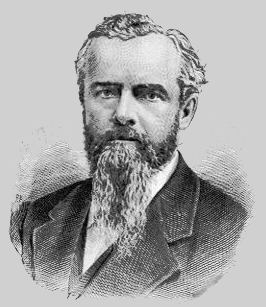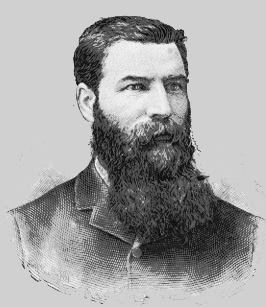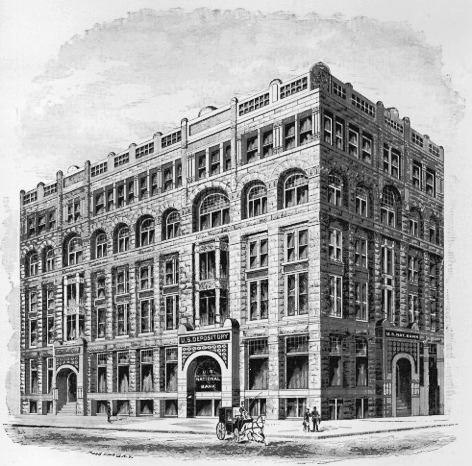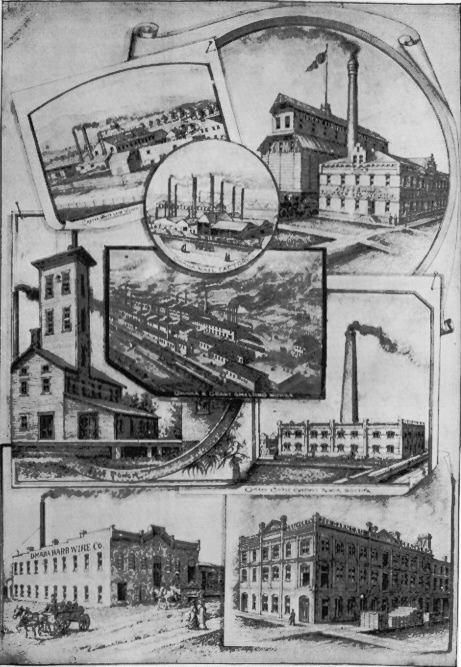|
OMAHA
ILLUSTRATED.
and wide-awake spirit of the citizens who
were directing the community's welfare. In that year the
people of Omaha wisely agreed that if the city was to have a
desirable future it could
[The Commercial National
Bank was established May 1, 1884, the chief promoter being
the late Mr. Ezra Millard, who had been the president of the
Omaha National Bank from its organization in 1866. The
capital stock is $300,000, all paid in. Mr. Millard was its
first president, and held that position until his death in
August, 1886, guiding wisely and prudently the new
enterprise

THE LATE EZRA MILLARD.
|
during this time. On May 1, 1885, one year after
beginning business, the bank's deposits stood at
$351,891, and its loans and discounts at $526,481,
showing not only an established prosperity but
careful and conservative management. On May 1,
1886, deposits stood at $419,029, loans and
discounts at $633,274, with a surplus of $17,000.
On May 1, 1887, deposits stood at $719,434, loans
and discounts at $756,538, the surplus being
$20,000, and undivided profits, $11,117. Thus
during two years from May, 1885, to May, 1887, the
bank deposits had increased $367,343, and its loans
and discounts $230,054, notwithstanding two other
national banks had in the meantime been
established. Upon the death of Mr. Millard, Mr. A.
P. Hopkins (who, on coming to Omaha in 1866, was
for a time connected with the Omaha National Bank,
while Mr. Millard was its president, and later
engaged for thirteen years in banking at Fremont)
was elected president, Mr. Alfred Millard, son of
the late president, was made cashier, and F. B.
Bryant, assistant cashier. The members of its board
of directors are: Wm. G. Maul, Clark Woodman,
Andrew Henry, S. R. Johnson, L. B. Williams, E. M.
Morsman and Joseph Garneau, Jr., men of
acknowledged financial soundness and ability,
giving to the public every assurance of maintaining
the safe and prudent course which has so far
brought the
|
|
bank into general esteem. Of the late Ezra
Millard it can be said that he was one of the best
of our great citizens and one of the greatest of
our good citizens. He came as near being an ideal
and a model for imitation as any man whom Omaha has
known. As a banker he was broad, level-headed and
sagacious; as a business man in any department,
far-seeing, methodical and progressive; as a
citizen he was generous, public-spirited and
wonderfully well informed. He was a pioneer. Under
his eye this city has grown from a hamlet. He was
foremost in its interests, and his foresight and
counsel aided its development. For nearly thirty
years his prominence and influence have been
recognized throughout the State and far beyond its
boundaries. He was also the founder of the Omaha
National Bank, of which he was president for
eighteen years. To the railroad interests of the
city he devoted his energies and abilities, and
contributed largely to the development of this as a
railroad center. Mr. Millard was born in 1834 at
Hamilton, Ontario. He came to the States with his
parents in 1850, and settled in Iowa, from whence
he came to Omaha in 1856. He became a member of the
land agency firm of Barrows, Millard & Co., the
company
|

A. P. HOPKINS, PRESIDENT
COMMERCIAL NATIONAL BANK.
|
|
beginning the banking business in 1860. The firm
of Millard, Caldwell & Co. was organized later
on and he remained with it until 1870. He was
largely interested in real estate and building, and
at the time of his death was vice-president of the
Union Trust Company and treasurer of the Cable
Tramway Company. He at one time served as mayor of
the city. Mr. Millard was a Christian and a member
of the Presbyterian church. His, death occurred at
Saratoga Springs, New York, August 20, 1886. It was
very sudden and caused by heart disease. He was cut
off in his prime, being but fifty-three years of
age. His loss has been deeply felt by all
interested in the growth of this city and
State.
|
|
|
|
|
[66]
|



